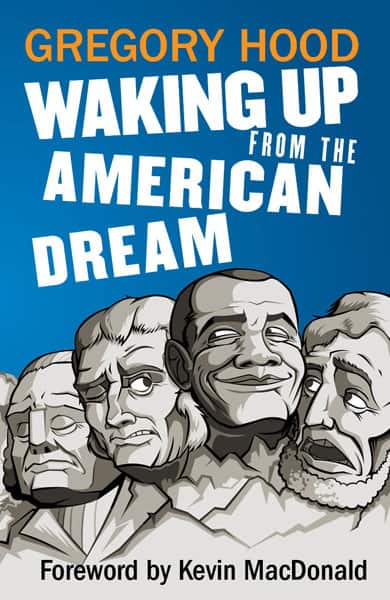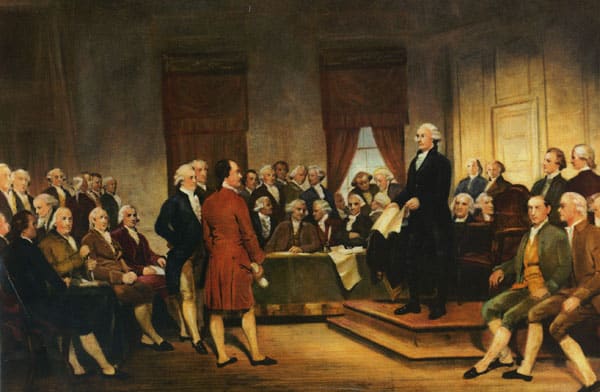The Irreplaceable Gregory Hood
Chris Roberts, American Renaissance, July 11, 2016
Gregory Hood, Waking Up from the American Dream, Counter-Currents Publishing, 2016, 180 pp., $15.00 (softcover).
Gregory Hood’s popularity is no secret. Readers of dissident publications often tweet and comment such sentiments as, “The other side has everything else; we have Gregory Hood,” “Gregory Hood 2016,” and “If you aren’t reading everything by Gregory Hood you are robbing yourself.” I have met white advocates who say it was Gregory Hood who saved them from being libertarians or Republicans.
Those who make a living watching us are also taken with Mr. Hood. The Southern Poverty Law Center first noticed him in 2013 and now regularly quotes his essays. The Anti-Defamation League has created a tag for him on its website.
Mr. Hood is often quoted by the mainstream press. Jeet Heer of the The New Republic looks to Mr. Hood’s writings as a compass for what the dissident right is up to, and Mr. Hood has been mentioned and quoted by Foreign Policy, FlavorWire, Salon, Jezebel, and Medium. Which is to say that a collection of Hood essays has been long overdue, and we must thank Greg Johnson and Counter Currents for putting together what I hope is only Mr. Hood’s first collection: Waking Up From the American Dream.

Sandwiched between an uncharacteristically personal introduction that touches on Mr. Hood’s background, and an afterword on Donald Trump are three sections: White Nationalism, The Failure of Conservatism, and Religion & Guns. His best qualities shine throughout the entire collection.
Mr. Hood is a student of history, with an impressive knowledge of the Founding Fathers. Throughout the book he draws from America’s founding documents, the Federalist Papers, and even the correspondence of leaders of the Revolution. The opening lines of his essay, “For Others & Their Prosperity,” is a powerful example of how he marshals the thinking of the Founders to our cause:
There exists no simpler, shorter, or more poetic expression of nationalism than five words from the Constitution of the United States–“For Ourselves and Our Posterity.” For all the flaws of the Founding, no white nationalist can dispute the beauty of that phrase, nor its relevance to our cause.

Mr. Hood invokes the Founders for two reasons: First, to show that we are not mere race-obsessed cultists with a pet philosopher or two, but also to show how thoroughly American we are. Mr. Hood does not write for comrades, he writes to convince, and if there’s one period of history that Americans–especially conservatives–are familiar with, it is the Founding. At least until further notice, the Founders bless our money, decorate our government buildings, and are studied in school from an early age. They are a point of reference for Americans in a way that Julius Evola and Alain de Benoist will never be.
Mr. Hood cites the Founders because as an American, they make up his roots: For better or for worse, they are any American white nationalist’s antecedents. For Mr. Hood, looking first to the Founders and then to the world around us is a path by which every American can come to our views. His richly American frame of reference make his essays casually accessible to Americans who have not yet seen the light about race. He is subversion in red-white-and-blue bunting.
Another element of Mr. Hood’s persuasiveness is his biting style, as in this passage about that dishonest huckster, Dinesh D’Souza:
There’s no easier way to make a living than as a non-white activist in the American conservative movement. Simply offer well-meaning whites the nectar of racial absolution and say you care about their country, and they will throw money at you no matter what else you do.
Nor does Mr. Hood spare Republicans who claim that Americans have the right to bear arms so that, if need be, they can overthrow the government:
Conservatives aren’t going to shoot anybody. They soil themselves when someone calls them racist, and we are supposed to believe that they are going to take the “God bless our troops” stickers off their SUVs and start mowing down Marines?
He writes further on guns:
Concealed carry permit holders, who are far less likely to commit crimes than the general population, are charged with secretly lusting to murder children. Meanwhile, the Left, operating, as always, without irony, is merrily tweeting away death threats to their political opponents.
But more important than either Mr. Hood’s knowledge of history or his rapier prose are his insights. He has an unparalleled ability to cut straight to the heart of the question. Here is an example:
Gun owners are proof that people can exist and survive outside the managerial state’s system of control. As with homeschoolers, traditional religious communities, and, well, “racists,” guns present a greater moral danger to the Left than a physical danger. When the people are disarmed, it does not mean that insurrection suddenly becomes impossible because the military equation has changed. It means that insurrection is impossible because psychologically Americans will have admitted they cannot live without an egalitarian bureaucracy informing them how to behave and what to think, and they will not allow others to do so. Gun owners are hated because they say that playtime is over. We’re hated because we say it is time to grow up.
No one has been able to write that well for our side since Sam Francis died. Mr. Hood’s humor and sarcasm both disarm his targets and charm his readers. His interest in gun rights and his disgust with our cultural malaise let him engage Republicans on their terms. His even-handed and well-researched views of Christianity give him a maturity and professionalism often lacking in theological debates in any part of the political spectrum.
Mr. Hood has a large body of work, and one can’t help being disappointed when favorites are omitted. I would have loved to see “The War on Whites is All They Have” and “The Solution is State Power” in this collection, but long books go unread, and there’s always the next volume.
The concluding essay on Donald Trump is interesting, but could soon date the collection. Mr. Trump inspires hope and he is worth talking about, but he may become a point of historical obsession that becomes off-putting to outsiders, the way paleocons still talk about Pat Buchanan and aging hippies still talk about George McGovern.
Still, Waking Up From the American Dream is a triumph. It has the bite of H.L. Mencken, the analytical insights of Paul Gottfried, the racial consciousness of Sam Francis, and the readability of Breitbart.com. Like Jared Taylor and Charles Murray, Gregory Hood has done the nearly impossible: write a book that could be given to an unconvinced American–and actually convince him. Keep ‘em coming, Mr. Hood.















